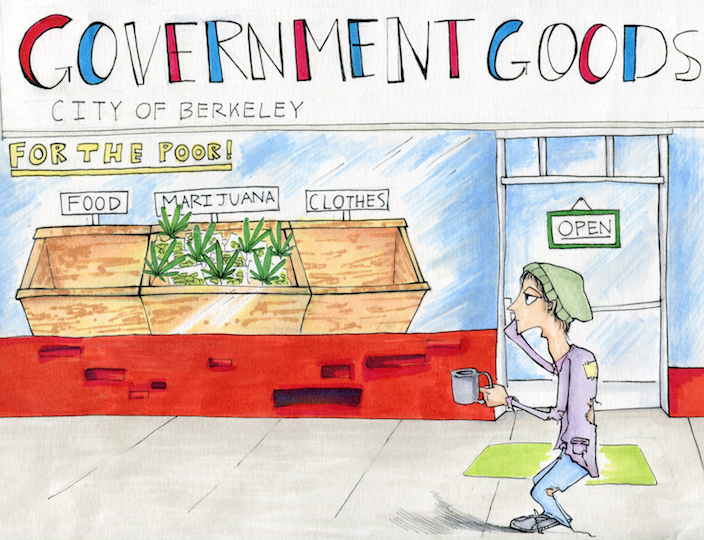Berkeley’s needy are getting ‘weedy’
Do you make less than $32,000 a year and own a medical marijuana card?
Don’t worry: Berkeley has free weed for you, instead of food and necessities you actually need for survival.
Recently, Berkeley’s City Council unanimously passed a law to make medical marijuana free for low income workers.
“There are some truly compassionate cases that need to have medical marijuana,” said Berkeley Mayor Tom Bates, via the New York Times. “But it’s expensive.”
In Bates’ perspective, since Mary Jane is regarded as medicine under California state law, then giving away “medicine” to people in need is completely reasonable.
Due to Devil’s Lettuce’s illegality under federal law, insurance companies won’t cover it, and it costs up to $400 an ounce. All dispensaries in Berkeley are required to give 2 percent of their total inventory away for free.
“No one has really quantified the legitimate demand; they just set the 2 percent threshold out of thin air,” said Sean Luse, Chief Operating Officer of Berkeley Patients Group Dispensary, to the New York Times. “Are we going to be forcing medicine on people just because it’s the law? There could definitely be a financial incentive for folks to resell it.”
With all due respect to Bates’ good intentions, most people buying combustible herbage from dispensaries are using it for recreational use.
“There’s a huge demand,” said Bates to the NY Times. “We could make it 20 percent.”
If the city council increases this forced charity to twenty percent on dispenseries, it could be stealing up to $112,000 per year. This money could be better spent elsewhere, such as on the homeless of Berkeley.
“Instead of taking steps to help the most economically vulnerable residents get out of that state, the city has said, ‘Let’s just get everybody high’,” John Lovell, a lobbyist for the California Narcotic Officers’ Association, told the NY Times.
Despite the praise and resentment toward the new law, Berkelians didn’t have much objection toward this new law.
“If you believe marijuana is medicine, then helping low-income people purchase the medicine they need kind of makes sense to me,” said Bill Green, a solar energy company employee, to the NY Times.
Berkley has its history in such liberal acts, such as the Free Speech Movement in the mid 1960s. So it is no surprise Berkeley is once again under the limelight for such a forward approach.
Most people are worried that this new law is the beginning to the full legalization of pot in the state of California, which would lead to more people smoking the Jolly Green Giant.
This would cause less social productivity. And no one wants that to happen, right?






